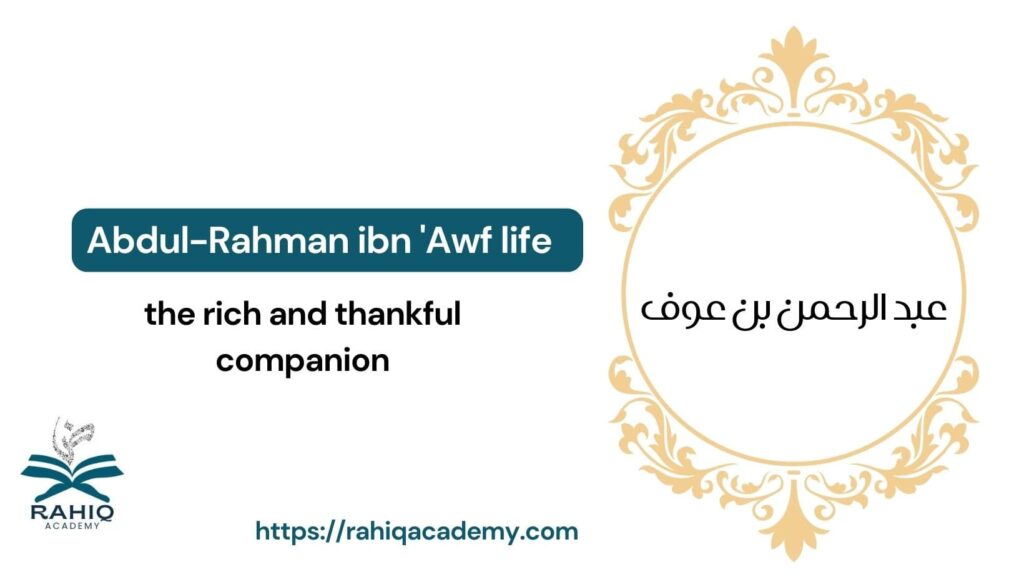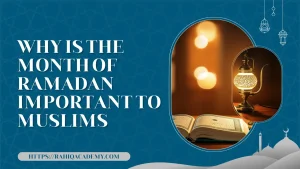Abdul-Rahman ibn ‘Awf was one of the greatest companions of the Prophet Muhammad and one of the ten companions who were personally promised Paradise
He lived through some of the most challenging times in early Islamic history, from the hardships in Makkah to the migration to Madinah, from fighting in major battles to playing a crucial role in choosing the next Caliph.
This article covers every aspect of Abdul-Rahman ibn ‘Awf life , his struggles, and his lasting impact on the world.
Life in Medina
Migration and Starting Over
When Abdul-Rahman ibn ‘Awf (RA) migrated to Madinah, he left everything behind—his business, his home, and his wealth. He arrived in a new city with nothing. To help the Muhajirun (the emigrants from Makkah) settle in, the Prophet Muhammad (ﷺ) paired each migrant with an Ansari (a Muslim from Madinah) in a brotherhood pact.
Abdul-Rahman (RA) was paired with Sa‘d ibn al-Rabi‘ (RA), one of the richest men in Madinah. Sa‘d, being incredibly generous, told him:
“I am the wealthiest man in Madinah. Take half of my wealth. I even have two wives—whichever one you choose, I will divorce her so you can marry her.”
But Abdul-Rahman ibn ‘Awf (RA) was not the kind of man who wanted handouts. He politely declined the offer and asked:
دلني على السوق
“Show me the marketplace”
He went to the Madinah market, bought and sold goods, and within a short time, he built himself back up. He was soon successful again, proving that hard work, honesty, and intelligence can bring success, even if you have to start from nothing.
His Business Ethics
Abdul-Rahman ibn ‘Awf (RA) always did business honestly and fairly. He followed the Quranic command:
وَأَوْفُوا الْكَيْلَ وَالْمِيزَانَ بِالْقِسْطِ وَلَا تَبْخَسُوا النَّاسَ أَشْيَاءَهُمْ
“And give full measure and weight in justice, and do not deprive people of their due.”
(Surah Al-A‘raf 7:85, Quran)
He never cheated anyone, never took advantage of desperate people, and never engaged in haram (forbidden) business practices. His wealth grew, but so did his generosity.
Invasion of Dumatul-Jandal
The Mission
In 6 AH (627 CE), the Prophet Muhammad (ﷺ) appointed Abdul-Rahman ibn ‘Awf (RA) as the leader of a military invasion of Dumatul-Jandal, a key trading city in northern Arabia. His mission was clear:
- Call the people to Islam first, peacefully.
- Only fight if they refused and became hostile.
Before leaving, the Prophet (ﷺ) told him:
“Go forth with Allah’s blessing. Call them to Islam first. If they accept, they are your brothers. If they refuse, then fight in the cause of Allah.”
Victory Through Diplomacy
When Abdul-Rahman ibn ‘Awf (RA) arrived, he approached Al-Asbagh ibn Amr al-Kindi, the Christian leader of the city. Instead of immediately waging war, he engaged in peaceful dialogue.
Al-Asbagh was impressed by the justice of Islam and willingly accepted it. Many of his people followed, making the mission a success without a single battle.
To strengthen the alliance, Abdul-Rahman (RA) married Al-Asbagh’s daughter, a common way to build bonds between tribes.
Rashidun Caliphate
Advising Abu Bakr (RA) and Umar (RA)
After the Prophet Muhammad (ﷺ) passed away, Abdul-Rahman ibn ‘Awf (RA) became a trusted advisor to both Abu Bakr (RA) and Umar ibn al-Khattab (RA).
Selecting Uthman ibn Affan (RA) as Caliph
When Umar (RA) was dying, he appointed a council of six to choose the next Caliph. Abdul-Rahman ibn ‘Awf (RA) was given the final say.
After days of consultation, he chose Uthman ibn Affan (RA), believing he would best serve the Muslim ummah.
Personal Life
A Life of Giving
Abdul-Rahman ibn ‘Awf (RA) was incredibly wealthy, but he was even more generous. Some of his biggest acts of charity included:
- Donating 500 horses and 1,500 camels for the Battle of Tabuk.
- Feeding thousands of the poor in Madinah.
- Leaving a massive donation to the Prophet’s (ﷺ) widows.
His fear of wealth holding him back from Jannah was real. He once heard the Prophet (ﷺ) say:
يَدْخُلُ الْجَنَّةَ الْفُقَرَاءُ قَبْلَ الْأَغْنِيَاءِ بِنِصْفِ يَوْمٍ وَذَلِكَ خَمْسُمِائَةِ عَامٍ
“The poor will enter Paradise 500 years before the rich.”
(Sunan al-Tirmidhi, 2353)
Abdul-Rahman ibn ‘Awf Death
Abdul-Rahman ibn ‘Awf death was in 32 AH (652 CE) at the age of 72. Before his death, he had a dream where he saw his companions enter Jannah before him due to his wealth. This led him to give even more in charity.
He was buried in Jannat al-Baqi, and Caliph Uthman (RA) led his funeral prayer.
FAQs
Q:What was Abdul-Rahman ibn ‘Awf’s business?
A:He was a merchant in food, textiles, and livestock, known for fair trade and honesty.
Q:How much was he worth?
A:He left behind 1,000 camels, 100 horses, 3,000 sheep, but gave away most of his wealth.
Conclusion
Abdul-Rahman ibn ‘Awf life showed that faith and wealth can go hand in hand—if wealth is used for the right purpose.
Want to learn more? Join Rahiq Academy today!
Deepen your knowledge of the Sahaba, Quran, and Islamic history.
Sign up now and start your journey to knowledge!




